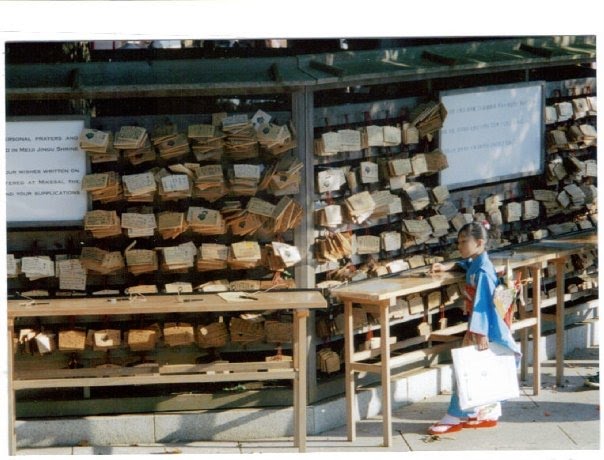Imagine a government official or
soldier standing before you, demanding that you stand on an engraved, wooden
picture of Jesus and Mary. If you stand on
the picture, you will go against your secret, Christian faith. But, if you refuse and demonstrate your
faith, you face the punishment of prison and possibly death. Many Christians faced this difficult decision
between 1614 and 1873, when Christianity was banned in Japan.
 |
| a fumi-e, a plaque used to test one's faith |
Shusaku Endo wrote a powerful
play called The Golden Country, and
it’s about the persecution and martyrdom of Christians during this time. In the introduction, Endo explained what
Christians faced if they were captured: "Since the ordinary death
penalties by decapitation or crucifixion served but to win admiration for the
martyrs, who went to their deaths joyfully, singing hymns and exhorting the
crowds, crueler and crueler tortures were devised. To prolong the agony of victims at the stake,
as well as to give additional time for reconsideration, wood was placed at some
distance so that the sufferers roasted by the slow fire. Boiling water from the Japanese hot springs was
slowly poured over the victims, a dipperful at a time. Christians were tied to stakes at the water’s
edge at ebb tide and slowly went to their deaths as the tide came in." (Kindle file)** Endo went on to describe even more graphic and violent techniques used to persuade Christians to deny their faith. I do highly recommend reading this play to learn more about the persecution of Japanese Christians, though it’s not appropriate for children.
During the prohibition of
Christianity, many hidden Christians lived double lives. Outwardly, they observed Buddhism and
Shintoism, following the edicts of the law.
Secretly, they worshipped God in their homes and continued practicing
their Christian faith. Some people even
had secret rooms for worshipping and Buddhist statues with crosses or other
Christian icons hidden on the back.
Last week, I joined 2 Japanese
pastors, 2 Japanese students, and 3 American missionaries in learning
more. We visited Amakusa, a city where
many hidden Christians lived. First we
visited the Amakusa Christian Museum. I
learned that the root of the persecution came from fear. Many Japanese leaders worried that Western
influences were growing too strong and that the Japanese values, culture, and
way of life were suffering. They thought
that stamping out Christianity would prevent the spread of Western influences.
 |
| Amakusa Christian Museum |
 |
| Group picture (plus one random tourist who joined our picture) |
 |
| Christian Cemetery in front of the Amakusa Christian Museum |
Next, we went to the Amakusa
Municipal Rosary Museum. Once again, we
couldn’t take pictures inside though.
 |
| Amakusa Municipal Rosary Museum |
 |
| Oe Catholic Church, behind the AMRM |
Last, we went to Sakitsu Catholic
Church. It’s an old church beautifully situated in a small,
fishing village.
 |
| Sakitsu Catholic Church |
 |
| 2nd Group Picture |
 |
| In front of Sakitsu Catholic Church |
 |
| Japanese Fish Pond with Christian Statues in front of the church |
Views toward Western culture have
dramatically changed during the last century, but only about 1% of Japan is
Christian, even now. I have experienced
amazing hospitality during my time as a missionary in Japan, and spending the
day with 4 Japanese Christians was just one reminder of that. Thankfully, Christians are no longer tortured
and executed in Japan, but sometimes they do still experience persecution. Some families think Christianity conflicts
with obligations to ancestral shrines or honoring one’s deceased
relatives. Fear of familial conflict or
threats of being ostracized from family and friends cause some Japanese
Christians to keep their faith a secret from those closest to them. So, please remember to pray for the hidden
Christians that still exist in Japan today, and may God give each of them
courage to stay strong in their Christian faith.
**Formatting problems made it impossible to use a correct block quoting format. Sorry.











Amen. I agree.. I have been told that this is just a phase.. going to church and seeking God a phase? To me.. it's not about being labeled a religion, its about a relationship. Praying.. listening.. waiting.. Knowing Who and what you believe in is important.Read more
ReplyDeleteI am so thankful that Christianity is more than a phase. I pray that the Holy Spirit would stir in people's hearts throughout Japan and that those people would know just how amazing it is to walk through life with Jesus.
Delete